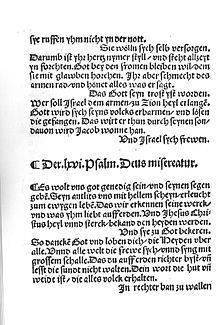Es spricht der Unweisen Mund wohl: Skillnad mellan sidversioner
Haeffner (diskussion | bidrag) |
Haeffner (diskussion | bidrag) Ingen redigeringssammanfattning |
||
| Rad 3: | Rad 3: | ||
[[Fil:Enchiridion geistlicher Gesänge 28.jpg|thumb|right|''Der XIII. Psalm. "Dixit insipiens in cor.'', sid 2, Erfurt Enchiridion, 1524]] | [[Fil:Enchiridion geistlicher Gesänge 28.jpg|thumb|right|''Der XIII. Psalm. "Dixit insipiens in cor.'', sid 2, Erfurt Enchiridion, 1524]] | ||
'''Es spricht der Unweisen Mund wohl''', på engelska "The mouth of fools doth God confess"<ref name="Hymnary" /> är en Luthersk [[psalm]] från 1524, med ord av [[Martin Luther]] in 1523, paraphraserande [[Psaltaren 14]]. It was published as one of eight songs in 1524 in the first Lutheran hymnal, the [[Achtliederbuch]]. It was also published later that year i [[Erfurter Enchiridion]]. It has appeared in many hymnals, both in German and in translation. The text inspired vocal and organ music by composers such as [[Johann Pachelbel]]. | '''Es spricht der Unweisen Mund wohl''', | ||
på engelska "The mouth of fools doth God confess"<ref name="Hymnary" /> är en Luthersk [[psalm]] från 1524, med ord av [[Martin Luther]] in 1523, paraphraserande [[Psaltaren 14]]. It was published as one of eight songs in 1524 in the first Lutheran hymnal, the [[Achtliederbuch]]. It was also published later that year i [[Erfurter Enchiridion]]. It has appeared in many hymnals, both in German and in translation. The text inspired vocal and organ music by composers such as [[Johann Pachelbel]]. | |||
== Historia and text == | == Historia and text == | ||
Versionen från 7 september 2022 kl. 09.52

Es spricht der Unweisen Mund wohl,
på engelska "The mouth of fools doth God confess"[1] är en Luthersk psalm från 1524, med ord av Martin Luther in 1523, paraphraserande Psaltaren 14. It was published as one of eight songs in 1524 in the first Lutheran hymnal, the Achtliederbuch. It was also published later that year i Erfurter Enchiridion. It has appeared in many hymnals, both in German and in translation. The text inspired vocal and organ music by composers such as Johann Pachelbel.
Historia and text
At the end of 1523, Luther paraphrased Psaltaren 14 (Psalm 13 in Vulgata numbering), in Latin Dixit insipiens in cor, attempting to make the psalms accessible to Protestant church services in German. As he did with Ach Gott, vom Himmel sieh darein, Luther expanded the content of the psalm to show the precise situation of the early Reformationen as a time of conflict.[2] Luther skrev sex strofermed vardera sju rader.[3]
The hymn was one of the eight hymns in the first Lutheran hymnal, published 1524 in Nuremberg under the title Etlich Cristlich lider (Some Christian songs), also called Achtliederbuch,[4] which contained four songs by Luther, three by Paul Speratus, and one by Justus Jonas.[4] Later that same year it appeared in Erfurt in Eyn Enchiridion, and in Wittenberg in Johann Walter's choral hymnal Mall:Lang[3] in a five-part setting.[5]
Melodi
In the Achtliederbuch, "Es ist das Heil uns kommen her", by Paul Speratus, was indicated as the singing tune for "Es spricht der Unweisen Mund wohl".[6][7] The hymn appeared with its own melody in the Walter hymnal: that melody, Zahn No. 4436, remained associated with it.[5][8]
The hymn was set by composers for instruments and for voices. Johann Pachelbel composed three chorale preludes for organ as part of Mall:Lang before 1693. Johann Sebastian Bach set the hymn in a four-part setting, BWV 308,[9] but without text. The text was added in the Neue Bach-Ausgabe.[10]
Översättningar
The hymn was translated to English as "The mouth of fools doth God confess" and appeared in R. Massie's M. Luther's Spiritual Songs in 1854. It was copied to other hymnals. Other, less common translations were published in the 19th century.[1]
På svenska lyder titeln Then ogudachtige säger så
Se även
Mall:Hymns and songs based on Psalms Mall:Martin Luther Mall:Lutheran hymns with English texts Mall:German Lutheran hymns
Källor
- ↑ 1,0 1,1 Referensfel: Ogiltig
<ref>-tagg; ingen text har angivits för referensen med namnetHymnary - ↑ Referensfel: Ogiltig
<ref>-tagg; ingen text har angivits för referensen med namnetHofreiter - ↑ 3,0 3,1 Referensfel: Ogiltig
<ref>-tagg; ingen text har angivits för referensen med namnetGesellschaft - ↑ 4,0 4,1 Referensfel: Ogiltig
<ref>-tagg; ingen text har angivits för referensen med namnetWursten - ↑ 5,0 5,1 Referensfel: Ogiltig
<ref>-tagg; ingen text har angivits för referensen med namnetWalter - ↑ Referensfel: Ogiltig
<ref>-tagg; ingen text har angivits för referensen med namnetCrist - ↑ Referensfel: Ogiltig
<ref>-tagg; ingen text har angivits för referensen med namnetchorale melody 1 - ↑ Zahn, Johannes (1890) (på de). Die Melodien der deutschen evangelischen Kirchenlieder. "III". Gütersloh: Skriptfel: Modulen "String" finns inte.. Sid. 73.
- ↑ Referensfel: Ogiltig
<ref>-tagg; ingen text har angivits för referensen med namnetBach - ↑ Referensfel: Ogiltig
<ref>-tagg; ingen text har angivits för referensen med namnetChorale
